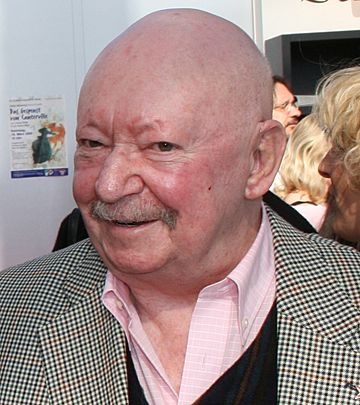Günter Kunert facts for kids
Quick facts for kids
Günter Kunert
|
|
|---|---|

Kunert in 2008
|
|
| Born | 6 March 1929 Berlin
|
| Died | 21 September 2019 (aged 90) Kaisborstel, Germany
|
| Occupation |
|
| Organization | |
| Awards |
|
Günter Kunert (born March 6, 1929 – died September 21, 2019) was a famous German writer. He lived in East Berlin and started publishing poems in 1947. A well-known writer named Bertolt Brecht helped him early in his career.
In 1976, Kunert signed a petition to support another writer, Wolf Biermann, who had lost his citizenship. Because of this, Kunert lost his membership in the main political party of East Germany. Two years later, he moved to West Germany.
Günter Kunert was known as a very talented and flexible writer. He wrote many different types of works, including short stories, essays, books about his own life, movie scripts, and novels. He received special honors and awards from around the world.
Life and Work
Kunert was born in Berlin. After finishing elementary school, he couldn't go to high school. This was because of the National Socialist laws, which were unfair to people whose mothers were Jewish.
After World War II, Kunert studied art in East Berlin from 1946 to 1949. But he soon decided to focus on writing. His very first poem was published in 1947. With help from Bertolt Brecht, he began publishing in a funny newspaper called Ulenspiegel. His first collection of poems came out in 1950.
In 1949, he joined the Socialist Unity Party (SED), which was the main political party in East Germany. However, in 1976, he signed a petition to protest against his fellow writer, Wolf Biermann, losing his citizenship. Because of this, Kunert was removed from the SED party. In 1979, he was allowed to leave East Germany with a special pass. He moved to a town near Itzehoe in northern Germany with his wife, Marianne, and their granddaughter, Judith.
Kunert was seen as one of the most important German writers of his time. He wrote many different kinds of texts. Besides poems, he also wrote short stories, essays, books about his life, funny sayings, fairy tales, science fiction stories, and even scripts for radio plays and movies. He also wrote a novel and a play. Besides writing, Kunert was also a painter and a graphic artist.
In his writings, he often shared his strong opinions. He was critical of Nazism and also questioned the idea that progress is always good. Kunert was also against the German spelling reform of 1996, which changed how German words were spelled. He was a member of the P.E.N. Club, a group for German-speaking authors.
Günter Kunert passed away in Kaisborstel on September 21, 2019, at the age of 90. He is buried in Berlin.
Awards and Recognition
Kunert received special honorary doctorates from several universities in Italy and the United States. This means they recognized his great achievements.
He also won several important awards:
- The Heinrich Heine Prize from Düsseldorf in 1985.
- The Order of Merit of the Federal Republic of Germany in 2012. This is a high honor from the German government.
- The Kunstpreis of Schleswig-Holstein in 2014.
Film Scripts
Günter Kunert wrote several scripts for movies made by DEFA, which was the state-owned film studio of East Germany. Some of these include:
- 1953: Das Stacheltier: Eine Liebesgeschichte
- 1960: Seilergasse 8
- 1962: Das zweite Gleis
- 1962/1990: Monolog für einen Taxifahrer
- 1963: Vom König Midas
- 1968: Abschied (1968)
- 1976: Beethoven – Tage aus einem Leben
- 1977: Unterwegs nach Atlantis (Film)
He also wrote scripts for films in West Germany:
- 1971: Karpfs Karriere
- 1982: Ein Stück Himmel
- 1984: The Blind Judge (a TV series with 13 episodes)
- 1984: Die Rückkehr der Zeitmaschine (1984)
- 1985: Der Schiedsrichter
Film About Kunert
- Günter Kunert und die Sächsische Schweiz, a film by Claus Spahn, made in 1993.
See also
 In Spanish: Günter Kunert para niños
In Spanish: Günter Kunert para niños
 | Shirley Ann Jackson |
 | Garett Morgan |
 | J. Ernest Wilkins Jr. |
 | Elijah McCoy |

